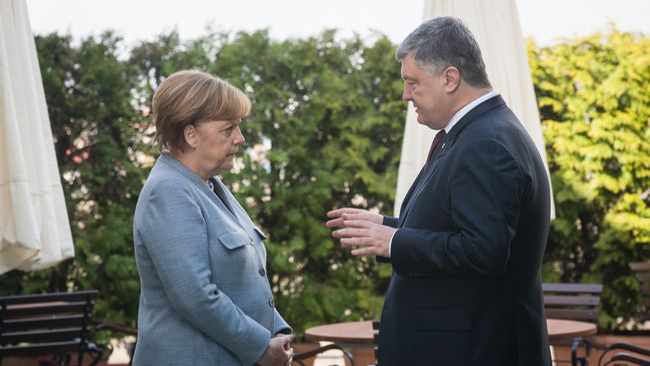Berlin and Kyiv: making up for lost time
Angela Merkel maintains that Nord Stream 2 is not possible without clarity on the future transit role of Ukraine
Ukraine’s President Petro Poroshenko paid a visit to Germany on April 10. Very recently, Angela Merkel was reelected chancellor for the fourth term, and a new government was appointed after the longest-ever coalition negotiations. The president’s website notes that Poroshenko is one of the first foreign leaders to visit Berlin after this political reshuffle.
At the same time, this visit is also rather long-awaited on the part of Ukraine. Firstly, the latest Normandy-format meeting of the leaders of Ukraine, Germany, France, and Russia to solve the problem of aggression in eastern Ukraine was last held July 2017, DW reports. Secondly, Berlin recently gave final permission to build the Nord Stream 2 gas pipeline that connects Russia and Germany, bypassing Ukraine. Thirdly, a plan of sending a UN peacekeeping mission to the Donbas is under discussion, and it is important for Kyiv to enlist Germany’s support in this question.
The president pointed out at a joint briefing with Chancellor Merkel that they had discussed the situation in eastern Ukraine, the organization of a UN peacekeeping mission, and imposition of sanctions in case of a failure to observe the Minsk Agreements.
According to President Poroshenko, Russia does not support so far the joint proposals of France, Germany, Ukraine, and the US about a peacekeeping mission “which will be not just an escort for OSCE observers but a full-fledged and full-scale force that can disarm illegal armed formations, protect people on the occupied territories, and create proper security conditions in order to begin the political process of local elections,” but the sides are not losing hope to resolve this problem.
As for the Nord Steam 2 project, the head of state only casually mentioned that this topic was also discussed. Yet when journalists asked Ms. Merkel whether the president convinced her that there is a political side to this project and whether Berlin is prepared to offer a compromise, she said this matter was discussed much in detail and she “listened to Ukrainian doubts very attentively.” “I also said to President Putin yesterday [on the phone]: it cannot be that, through Nord Stream 2, Ukraine has no further importance regarding the transit of gas,” she said. “Dependence on Russian gas will remain, but this is of strategic importance to Ukraine. I made it very clear that the Nord Stream 2 project is not possible without clarity on the future transit role of Ukraine.”
“GERMANY SUPPORTS THE UKRAINIAN INITIATIVE”
Stefan MEISTER, chairman, Robert Bosch Center for Central and Eastern Europe, Russia, and Central Asia:
“I don’t think Germany will stop supporting Nord Stream 2 in spite of all conflicts with Russia over the Skripal case. Even the US is very cautiously criticizing Nord Stream 2 despite the leverage the government and the president have under the latest sensational law. I don’t believe that the project will be shelved in Europe – there can only be an essential deterioration of relations. Germany supports the Ukrainian initiative, especially now that a new Foreign Minister, Heiko Maas, has assumed office, for we can see that the minister is taking a tougher approach to Russia and is not talking about gradually lifting the sanctions. But German society is pressing for better relations with Russia, and decision-makers were not satisfied with the way the Skripal case was handled.”
How can Berlin react to Poroshenko’s initiative about stationing peacekeepers in the occupied territory of eastern Ukraine and does Merkel have levers to force Putin to carry out the Minsk Agreements?
“Germany is not a UN Security Council member. It expresses support via the UN. It is a big question there. But, as Russia can impose a veto, it is difficult for Germany to speed up the process. But it supports this rhetorically.”
“GERMANY IS PLAYING A MAJOR ROLE IN THE CONTINUATION OF CURRENT EU SANCTIONS”
Andreas UMLAND, German political scientist, Senior Research Fellow at the Institute for Euro-Atlantic Cooperation:
“Germany cannot directly influence a decision on the peacekeeping mission, for it is not a permanent member of the UN Security Council. Yet it is playing a major role in the continuation of current EU sanctions. Moreover, it will take part in funding the expensive peacekeeping mission and revamping the Donetsk region’s infrastructure.
“What can pose a problem in German-Ukrainian relations in the future is implementation of the political clauses of the Minsk Agreements. Germany is likely to insist on a full implementation of the whole plan outlined in the Minsk Agreements. Ukraine should draw up a plan of how to respond to this challenge.
“The only lever the EU has is the continuation of sanctions.”
Newspaper output №:
№23, (2018)Section
Topic of the Day





